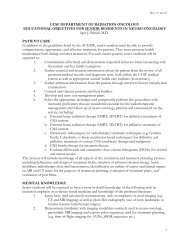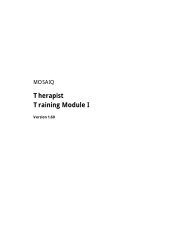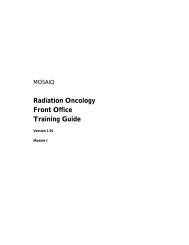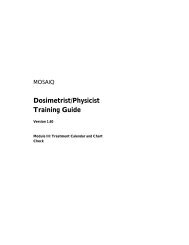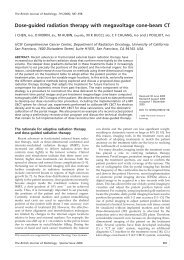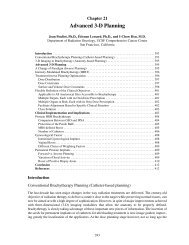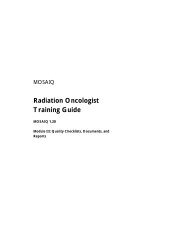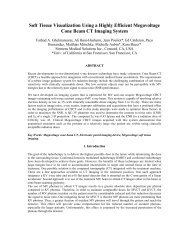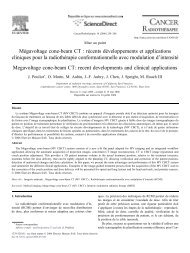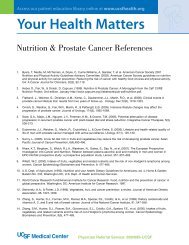RTOG 0920 A Phase III Study of Postoperative Radiation Therapy ...
RTOG 0920 A Phase III Study of Postoperative Radiation Therapy ...
RTOG 0920 A Phase III Study of Postoperative Radiation Therapy ...
You also want an ePaper? Increase the reach of your titles
YUMPU automatically turns print PDFs into web optimized ePapers that Google loves.
Protocol Version Date: 10/12/09 <strong>RTOG</strong> <strong>0920</strong><br />
CIRB Version Date: 10/12/09 Page 1 <strong>of</strong> 12<br />
CIRB Expiration Date: 04/19/10<br />
Initial submission: CF version date 10 NOV 2009<br />
UNIVERSITY OF CALIFORNIA, SAN FRANCISCO<br />
CONSENT TO PARTICIPATE IN A RESEARCH STUDY<br />
<strong>RTOG</strong> <strong>0920</strong><br />
A <strong>Phase</strong> <strong>III</strong> <strong>Study</strong> <strong>of</strong> <strong>Postoperative</strong> <strong>Radiation</strong> <strong>Therapy</strong> (IMRT)<br />
+/- Cetuximab for Locally-Advanced Resected Head and Neck Cancer<br />
This is a clinical trial, a type <strong>of</strong> research study. The UCSF Principal Investigator, Dr. Sue Yom and associates in<br />
the Departments <strong>of</strong> <strong>Radiation</strong> Oncology and Medical Oncology are carrying out this study as members <strong>of</strong><br />
<strong>Radiation</strong> <strong>Therapy</strong> Oncology Group (<strong>RTOG</strong>). Your study doctor will explain the clinical trial to you. Clinical trials<br />
include only people who choose to take part. Please take your time to make your decision about taking part. You<br />
may discuss your decision with your friends and family. You can also discuss it with your health care team. If you<br />
have any questions, you can ask your study doctor for more explanation.<br />
You are being asked to take part in this study because you have head and neck cancer that after surgery has an<br />
intermediate risk <strong>of</strong> recurring.<br />
Why is this study being done?<br />
The standard treatment <strong>of</strong> surgery (which you have had) followed by radiation therapy can stop tumors from<br />
growing in the head and neck region in most patients. However, the cancer can recur or can spread to other parts<br />
<strong>of</strong> the body. Cetuximab is a drug that may delay or prevent tumor growth by blocking certain cellular chemical<br />
pathways that lead to tumor development. It was approved by the FDA in 2006 for the treatment <strong>of</strong> head and<br />
neck cancer.<br />
The purpose <strong>of</strong> this study is to compare the effects, good and/or bad, <strong>of</strong> radiation therapy alone with radiation<br />
therapy and cetuximab on you and your cancer to find out which is better. In this study, you will get either<br />
radiation therapy alone OR radiation therapy and cetuximab.<br />
If you participate in this study, you will receive intensity modulated radiation therapy (IMRT). IMRT is a form <strong>of</strong><br />
radiation in which radiation beams are designed to avoid important normal parts <strong>of</strong> your body, such as your<br />
salivary glands.<br />
Your doctor also may decide to use a technique called image guided radiation therapy (IGRT). The purpose <strong>of</strong><br />
IGRT is to give radiation treatment more accurately to your tumor while decreasing the radiation to normal<br />
tissues. Small adjustments in your radiation treatment are made each treatment day based on x-ray images taken<br />
right before each day's treatment to ensure that your radiation treatment is given as accurately as possible.<br />
Use <strong>of</strong> IGRT may lead to improved accuracy <strong>of</strong> radiation treatment compared to regular radiation therapy and<br />
eventually, that will be more useful against cancer. At this time, however, there is no pro<strong>of</strong> that using this<br />
technique is more useful against cancer than regular radiation treatment without this technique.<br />
How many people will take part in the study?<br />
About 700 people will take part in this study.
Protocol Version Date: 10/12/09 <strong>RTOG</strong> <strong>0920</strong><br />
CIRB Version Date: 10/12/09 Page 2 <strong>of</strong> 12<br />
CIRB Expiration Date: 04/19/10<br />
Where will this study take place?<br />
All clinic visits and radiation treatment planning and radiation treatments will be given at the Helen Diller Family<br />
Comprehensive Cancer Center, <strong>Radiation</strong> Oncology, 1600 Divisadero, San Francisco, CA 94115. Where the<br />
cetuximab will be given will depend on where your medical oncologist is located; either in the Infusion Center <strong>of</strong><br />
the Helen Diller Cancer Center, the SF Oncology Group at 2100 Webster Street, San Francisco, or, If you are a<br />
San Francisco General Hospital patient, all tests and administration <strong>of</strong> cetuximab <strong>of</strong> will be done at San Francisco<br />
General Hospital.<br />
What will happen if I take part in this research study?<br />
For all patients: Your study doctor will need to send some <strong>of</strong> your tumor tissue (obtained when you had surgery)<br />
to be tested for EGFR expression. Epidermal growth factor receptor (EGFR) is a protein found on the surface <strong>of</strong><br />
cells, which can start reactions that cause cancer cells to grow. Some studies have suggested that patients with<br />
high EGFR have a better response to treatment. This tissue submission for testing is required for this study to see<br />
if the results <strong>of</strong> this test can predict patients’ response to the cetuximab.<br />
For patients with oropharynx cancer: Your tumor tissue also will be tested for the Human Papillomavirus (HPV).<br />
This tissue test is required for this study. Some studies have suggested that HPV-related cancer is biologically<br />
and clinically different as compared to non-HPV-related cancer. Some studies have found that patients with HPVrelated<br />
oropharynx cancer have a better response to treatment. This test will help researchers learn more about<br />
HPV-related cancer.<br />
After you have completed treatment on this study, your study doctor can request your EGFR level and/or HPV<br />
status from The <strong>Radiation</strong> <strong>Therapy</strong> Oncology Group (<strong>RTOG</strong>) and discuss it with you.<br />
Eligible participants will be "randomized" into one <strong>of</strong> the study groups described below. Randomization means<br />
that you are put into a group by chance. A computer program will place you in one <strong>of</strong> the study groups. Neither<br />
you nor your study doctor can choose the group you will be in. You will have an equal chance <strong>of</strong> being placed in<br />
either group.<br />
If you are in Group 1 (<strong>of</strong>ten called "Arm 1"), you will receive radiation therapy once a day, Monday through<br />
Friday, for about 6 weeks.<br />
If you are in Group 2 (<strong>of</strong>ten called "Arm 2"), you will receive radiation therapy once a day, Monday through<br />
Friday, for about 6 weeks and cetuximab, (an initial dose 1 week prior to radiation and then once a week during<br />
radiation for a total <strong>of</strong> 7 doses). You also will receive cetuximab after you finish radiation therapy, once a week for<br />
4 doses.<br />
For Group 2 Patients<br />
Before your first dose <strong>of</strong> cetuximab, you will be given some medicine through your vein to prevent an allergic<br />
reaction to cetuximab. Then you will be given the first dose <strong>of</strong> cetuximab through your vein for approximately two<br />
hours. You will not receive radiation therapy on the day you receive the first dose <strong>of</strong> cetuximab.<br />
Your blood pressure and overall physical condition will be closely monitored while you receive cetuximab and for<br />
at least one hour afterwards. If you have a severe allergic reaction to the first dose <strong>of</strong> cetuximab or any later<br />
doses, the study doctor will treat you for the reaction, and you may not receive further cetuximab on this study.<br />
You and the study doctor can discuss other treatments that you can receive <strong>of</strong>f study.<br />
If you tolerate the first dose <strong>of</strong> cetuximab well, the following week you will begin receiving cetuximab once a week<br />
before radiation therapy for 6 weeks and after you finish radiation therapy, you will receive cetuximab once a<br />
week for 4 weeks — a total <strong>of</strong> 11 doses <strong>of</strong> cetuximab.<br />
Initial submission: CF version date 10 NOV 2009
Protocol Version Date: 10/12/09 <strong>RTOG</strong> <strong>0920</strong><br />
CIRB Version Date: 10/12/09 Page 3 <strong>of</strong> 12<br />
CIRB Expiration Date: 04/19/10<br />
For All Patients<br />
Before you begin the study:<br />
You will need to have the following exams, tests or procedures to find out if you can be in the study. These<br />
exams, tests or procedures are part <strong>of</strong> regular cancer care and may be done even if you do not join the study. If<br />
you have had some <strong>of</strong> them recently, they may not need to be repeated. This will be up to your study doctor.<br />
• Assessment <strong>of</strong> tumor tissue removed during your surgery to see if you have the risk factors required in<br />
this study<br />
• Physical examination by several doctors<br />
• Examination <strong>of</strong> the back <strong>of</strong> your throat and voice box (larynx) with a mirror and/or a flexible lighted tube<br />
inserted through your mouth by an ear, nose and throat specialist or by a head and neck surgeon; this<br />
examination may be done in an <strong>of</strong>fice or may need to be done in the hospital under general anesthesia.<br />
The specialist or surgeon will talk with you about this procedure.<br />
• Evaluation <strong>of</strong> your ability to carry out daily activities<br />
• A chest x-ray or chest CT (Computed Tomography) scan or chest CT/PET (Positron Emission<br />
Tomography) scan<br />
– A CT scan is a study using x-rays to look at one part <strong>of</strong> your body.<br />
– A PET scan is a computerized image that looks at the activity <strong>of</strong> tumor cells in your entire body and<br />
that requires injection <strong>of</strong> a special marker into your vein, such as sugar (glucose) combined with a<br />
low-dose radioactive substance (a tracer). A camera records the tracer’s signal as it travels through<br />
your body.<br />
• Blood tests (about 2 teaspoons <strong>of</strong> blood will be taken from your vein)<br />
• For women able to have children, a pregnancy test<br />
• A dental evaluation before receiving radiation<br />
• An evaluation <strong>of</strong> your ability to chew and swallow<br />
• If your study doctor recommends:<br />
A CT scan with contrast (contrast means that dye is injected into your vein to increase the<br />
differences between normal and abnormal tissue), or a CT/PET scan and/or an MRI <strong>of</strong> your head<br />
and neck (Magnetic Resonance Imaging or MRI is imaging that uses a strong magnetic field to look<br />
at one part <strong>of</strong> your body.)<br />
An evaluation <strong>of</strong> your diet to see if a feeding tube is needed<br />
An EKG, a test <strong>of</strong> your heart function<br />
During the study:<br />
If the exams, tests and procedures show that you can be in the study, and you choose to take part, then you will<br />
need the following tests and procedures. They are part <strong>of</strong> regular cancer care.<br />
Weekly during radiation or radiation plus cetuximab:<br />
• A physical examination by several doctors<br />
• Evaluation <strong>of</strong> your ability to carry out daily activities<br />
• Blood tests (about 1 teaspoon <strong>of</strong> blood will be taken from your vein)<br />
• Evaluation <strong>of</strong> any side effects from treatment you may be having<br />
Every 3 weeks during radiation or radiation plus cetuximab and during cetuximab after radiation is completed:<br />
• Blood tests (about 1 teaspoon <strong>of</strong> blood will be taken from your vein)<br />
If your study doctor recommends:<br />
• CT/PET scan or MRI <strong>of</strong> your head and neck<br />
• A chest x-ray or chest CT scan or chest CT/PET scan<br />
• A biopsy to check for recurrence <strong>of</strong> the cancer<br />
You will need these tests and procedures in follow-up visits:<br />
They are being done to see how you and your cancer was affected by the treatment you received. These tests<br />
and procedures are part <strong>of</strong> regular cancer care.<br />
Initial submission: CF version date 10 NOV 2009
Protocol Version Date: 10/12/09 <strong>RTOG</strong> <strong>0920</strong><br />
CIRB Version Date: 10/12/09 Page 4 <strong>of</strong> 12<br />
CIRB Expiration Date: 04/19/10<br />
For Patients Receiving Cetuximab: After you finish taking cetuximab, you will have blood tests every 3 weeks for<br />
a total <strong>of</strong> 9 weeks (about 1 teaspoon <strong>of</strong> blood will be taken from your vein).<br />
For All Patients: At one month after you finish taking cetuximab:<br />
• A physical examination by several doctors<br />
• Examination <strong>of</strong> the back <strong>of</strong> your throat and voice box (larynx) with a mirror and/or a flexible lighted tube<br />
inserted through your mouth<br />
• Evaluation <strong>of</strong> your ability to carry out daily activities<br />
• Blood tests (about 1 teaspoon <strong>of</strong> blood will be taken from your vein)<br />
• An evaluation <strong>of</strong> your ability to chew and swallow<br />
• Evaluation <strong>of</strong> any side effects from treatment you may be having<br />
For All Patients: Every 3 months from the start <strong>of</strong> treatment for 2 years, every 6 months for 3 years, then once a<br />
year:<br />
• A physical examination by several doctors<br />
• Examination <strong>of</strong> the back <strong>of</strong> your throat and voice box (larynx) with a mirror and/or a flexible lighted tube<br />
inserted through your mouth<br />
• Evaluation <strong>of</strong> your ability to carry out daily activities<br />
• An evaluation <strong>of</strong> your ability to chew and swallow<br />
• Evaluation <strong>of</strong> any side effects from treatment you may be having<br />
• A CT/PET or MRI <strong>of</strong> your head and neck<br />
For All Patients: Once a year for 5 years:<br />
• A chest x-ray or chest CT scan or chest CT/PET scan<br />
For All Patients: If recommended by your study doctor:<br />
• A biopsy to check for recurrence <strong>of</strong> the cancer<br />
• Blood tests (about 1 teaspoon <strong>of</strong> blood will be taken from your vein)<br />
• Evaluation <strong>of</strong> any side effects from treatment you may be having<br />
Initial submission: CF version date 10 NOV 2009<br />
<strong>Study</strong> Plan<br />
Another way to find out what will happen to you during the study is to read the chart below. Start reading at the<br />
top and read down the list, following the lines and arrows.<br />
Group 1<br />
<strong>Radiation</strong> <strong>Therapy</strong><br />
Once a day, Monday-Friday<br />
for about 6 weeks<br />
Randomize<br />
(You will be in one group or the other)<br />
Group 2<br />
Initial Dose <strong>of</strong> cetuximab (no radiation<br />
therapy this week)<br />
Then the following week,<br />
<strong>Radiation</strong> therapy once a day,<br />
Monday-Friday for about 6 weeks<br />
and cetuximab once a week for 6 weeks<br />
After radiation therapy, cetuximab once a<br />
week for 4 weeks<br />
(A total <strong>of</strong> 11 doses <strong>of</strong> cetuximab)
Protocol Version Date: 10/12/09 <strong>RTOG</strong> <strong>0920</strong><br />
CIRB Version Date: 10/12/09 Page 5 <strong>of</strong> 12<br />
CIRB Expiration Date: 04/19/10<br />
How long will I be in the study?<br />
Group 1 patients will receive radiation therapy for about 6 weeks.<br />
Group 2 patients will receive a dose <strong>of</strong> cetuximab a week before radiation therapy, and if they tolerate cetuximab<br />
well, will receive cetuximab once a week during the 6 weeks <strong>of</strong> radiation therapy and after radiation therapy, once<br />
a week for 4 weeks — a total <strong>of</strong> 11 weeks <strong>of</strong> treatment.<br />
All patients will be asked to visit the <strong>of</strong>fice for a follow-up exam one month after finishing radiation therapy with or<br />
without cetuximab, then will be seen every 3 months from the start <strong>of</strong> treatment for 2 years, every 6 months for 3<br />
years, and then once a year for their lifetimes.<br />
Can I stop being in the study?<br />
Yes. You can decide to stop at any time. Tell the study doctor if you are thinking about stopping or decide to<br />
stop. He or she will tell you how to stop safely.<br />
It is important to tell the study doctor if you are thinking about stopping so any risks from the radiation and/or<br />
cetuximab can be evaluated by him/her. Another reason to tell your study doctor that you are thinking about<br />
stopping is to discuss what follow-up care and testing could be most helpful for you.<br />
The study doctor may stop you from taking part in this study at any time if he/she believes it is in your best<br />
interest; if you do not follow the study rules; or if the study is stopped.<br />
What side effects or risks can I expect from being in the study?<br />
You may have side effects while on the study. Everyone taking part in the study will be watched carefully for any<br />
side effects. However, researchers don’t know all the side effects that may happen. Side effects may be mild or<br />
very serious. Your health care team may give you medicines to help lessen side effects. Many side effects go<br />
away soon after you stop radiation therapy or stop taking the cetuximab. In some cases, side effects can be<br />
serious, long lasting, or may never go away. There also is a risk <strong>of</strong> death.<br />
You should talk to your study doctor about any side effects that you have while taking part in the study.<br />
Risks and side effects include:<br />
Risks Associated with <strong>Radiation</strong> to the Head and Neck<br />
Very Likely<br />
• Sores in the mouth and/or throat which can be painful and make it very difficult to chew and or swallow<br />
foods<br />
• Mouth dryness or changes in taste and/or smell that may be permanent<br />
• Thick saliva<br />
• Hoarseness<br />
• Tanning or redness and/or irritation <strong>of</strong> the skin in the head and neck area being treated with radiation<br />
• Ear pain and/or pressure<br />
• Fatigue<br />
• Weight loss<br />
• Permanent hair loss in the area treated with radiation<br />
• Loss <strong>of</strong> teeth, or cavities in the teeth, if strict dental care is not followed and/or hypersensitivity <strong>of</strong> teeth<br />
Initial submission: CF version date 10 NOV 2009
Protocol Version Date: 10/12/09 <strong>RTOG</strong> <strong>0920</strong><br />
CIRB Version Date: 10/12/09 Page 6 <strong>of</strong> 12<br />
CIRB Expiration Date: 04/19/10<br />
Less Likely, But Serious<br />
• Decrease in function <strong>of</strong> the thyroid gland that may require you to take thyroid replacement medicine to<br />
prevent you from feeling tired or sleepy<br />
• Serious damage to the spinal cord, nerves in the neck, jawbone, voice box, skin, or other parts <strong>of</strong> the<br />
head and neck that may require a major operation to correct and, rarely, can even be life threatening<br />
• Temporary pain or scarring around nerves in the shoulder that could cause numbness and/or weakness<br />
• Breathing problems<br />
• Difficulty with swallowing and eating for which you might need a long term or permanent feeding tube;<br />
possibility <strong>of</strong> inhaling food and/or liquids into the lungs – which could also result in pneumonia.<br />
• Serious ear infections and/or hearing loss<br />
• Damage to the spinal cord leading to permanent weakness and/or symptoms like a “stroke”<br />
• Permanent hair loss (<strong>of</strong> the face/chin/neck)<br />
Risks Associated with Cetuximab<br />
Very Likely<br />
Weakness<br />
Headache<br />
Fever<br />
Dry skin<br />
Localized acne-like skin reactions, rash, itching<br />
Low calcium or potassium in the blood<br />
Low magnesium in the blood, which could result in muscle cramps and/or weakness<br />
Inflammation under fingernails and/or toenails, which can last for several months after cetuximab is stopped<br />
Mild allergic or infusion reactions<br />
Less Likely<br />
Mouth sores<br />
Nausea and/or vomiting<br />
Diarrhea<br />
Constipation<br />
Upset stomach<br />
Reduced appetite, which could lead to weight loss<br />
Stomach pain<br />
Chills<br />
Dehydration<br />
Trouble sleeping<br />
Tiredness and/or sluggishness<br />
Feeling depressed<br />
Muscle aches<br />
Joint or back pain<br />
Build up <strong>of</strong> fluid in ankles, feet, and/or legs<br />
Shortness <strong>of</strong> breath<br />
Cough<br />
Hair loss<br />
Inflammation <strong>of</strong> the lining <strong>of</strong> the eye<br />
Dry eyes<br />
Less Likely, But Serious<br />
Reduced white blood cell count which could lead to an increased risk <strong>of</strong> infection, weakness, and/or in bleeding<br />
and bruising easily; this lowering <strong>of</strong> blood counts can lead to need for treatment with antibiotics, transfusions, or<br />
hospitalization if severe.<br />
Calcium or potassium levels so low that it may affect heart function<br />
Blood clots within a blood vessel in the lungs, legs, pelvis, or other places<br />
Kidney failure, which could lead to being hospitalized, or rarely, to death<br />
Sudden stopping <strong>of</strong> heart function leading to lack <strong>of</strong> oxygen and death (cardiopulmonary arrest)<br />
Serious allergic or infusion reactions (see details below)<br />
Initial submission: CF version date 10 NOV 2009
Protocol Version Date: 10/12/09 <strong>RTOG</strong> <strong>0920</strong><br />
CIRB Version Date: 10/12/09 Page 7 <strong>of</strong> 12<br />
CIRB Expiration Date: 04/19/10<br />
Rare<br />
Scarring <strong>of</strong> lung tissue, which could be life threatening or lead to death<br />
Possible allergic reactions to cetuximab<br />
Cetuximab also may cause allergic reactions such as hives, itching, and/or skin rash. Some patients have had<br />
allergic reactions with the first dose <strong>of</strong> cetuximab, but some patients have had reactions with later doses. The<br />
allergic reactions also can be severe, involving shortness <strong>of</strong> breath, wheezing, difficulty swallowing,<br />
lightheadedness, very low blood pressure, and rarely, heart attack and/or death.<br />
Your condition will be closely monitored during doses <strong>of</strong> cetuximab and for at least one hour afterwards. If you<br />
have a severe reaction, your doctor will treat you for the reaction, and you will not receive further treatment on this<br />
study. If you have a delayed severe reaction after receiving cetuximab, you must immediately tell your doctor.<br />
Diphenhydramine (or other antihistamine) pre-medication used prior to cetuximab may impair your ability to drive<br />
home, and you may need to seek alternative transportation home. It may also impair your ability to safely use<br />
power equipment for several hours.<br />
Risks Associated with Cetuximab and <strong>Radiation</strong> <strong>Therapy</strong><br />
The combination <strong>of</strong> cetuximab with radiation therapy could increase the likelihood and/or severity <strong>of</strong> the side<br />
effects <strong>of</strong> radiation therapy. The combination also could increase the risk <strong>of</strong> heart damage, including heart attack,<br />
abnormal heart rhythms, and/or heart failure, which could lead to death.<br />
Reproductive risks<br />
You should not become pregnant or father a baby while on this study because the radiation treatment and/or<br />
cetuximab in this study can affect an unborn baby. Women who are able to have children will have a pregnancy<br />
test before beginning treatment and during treatment. Women should not breastfeed a baby while on this study. It<br />
is important you understand that you need to use birth control while on this study. Check with your study doctor<br />
about what kind <strong>of</strong> birth control methods to use and how long to use them. Some methods might not be approved<br />
for use in this study. The treatment in the study may make you unable to have children in the future. Women <strong>of</strong><br />
childbearing age can ask their doctor for information about pre-treatment or post-treatment reproductive or fertility<br />
options prior to agreeing to participate in the study.<br />
For more information about risks and side effects, ask your study doctor.<br />
Are there benefits to taking part in the study?<br />
Taking part in this study may or may not make your health better. While doctors hope radiation therapy with or<br />
without cetuximab may keep your head and neck cancer from growing, there is no pro<strong>of</strong> <strong>of</strong> this yet. The effects <strong>of</strong><br />
a combination <strong>of</strong> radiation and cetuximab may be no different or worse than radiation alone. We do know that the<br />
information from this study will help doctors learn more about these therapies as a treatment for cancer. This<br />
information could help future cancer patients.<br />
What other choices do I have if I do not take part in this study?<br />
Your other choices may include:<br />
• Getting treatment or care for your cancer without being in a study<br />
• Taking part in another study<br />
• Getting no treatment<br />
Talk to your study doctor about your choices before you decide if you will take part in this study.<br />
Initial submission: CF version date 10 NOV 2009
Protocol Version Date: 10/12/09 <strong>RTOG</strong> <strong>0920</strong><br />
CIRB Version Date: 10/12/09 Page 8 <strong>of</strong> 12<br />
CIRB Expiration Date: 04/19/10<br />
Will my medical information be kept private?<br />
Data are housed at <strong>RTOG</strong> Headquarters in a password-protected database. We will do our best to make sure<br />
that the personal information in your medical record will be kept private. However, we cannot guarantee total<br />
privacy. Your personal information may be given out if required by law. If information from this study is published<br />
or presented at scientific meetings, your name and other personal information will not be used.<br />
Organizations that may look at and/or copy your medical records for research, quality assurance, and data<br />
analysis include:<br />
• The <strong>Radiation</strong> <strong>Therapy</strong> Oncology Group (<strong>RTOG</strong>)<br />
• The National Cancer Institute (NCI) and other government agencies, like the Food and Drug<br />
Administration (FDA), involved in keeping research safe for people<br />
• The Cancer Trials Support Unit (CTSU), a service sponsored by the National Cancer Institute (NCI) to<br />
provide greater access to cancer trials<br />
• The Central Institutional Review Board (CIRB)<br />
• Qualified representatives <strong>of</strong> Bristol-Myers Squibb, manufacturers <strong>of</strong> cetuximab<br />
• Qualified representatives <strong>of</strong> ImClone, co-developer with Bristol-Myers Squibb <strong>of</strong> Cetuximab<br />
• The Human Research Protection Program at UCSF<br />
• The UCSF Comprehensive Cancer Center<br />
You will also be given and asked to sign an additional Health Insurance Portability and Accountability Act (HIPAA)<br />
form that will provide additional information about the privacy <strong>of</strong> your records.<br />
What are the costs <strong>of</strong> taking part in this study?<br />
You and/or your health plan/ insurance company will need to pay for some or all <strong>of</strong> the costs <strong>of</strong> treating your<br />
cancer in this study. Some health plans will not pay these costs for people taking part in studies. Check with your<br />
health plan or insurance company to find out what they will pay for. Taking part in this study may or may not cost<br />
your insurance company more than the cost <strong>of</strong> getting regular cancer treatment. You will not be billed for any<br />
procedure done solely for research such as the research blood draw, the Quality <strong>of</strong> Life forms, and a piece <strong>of</strong> your<br />
biopsy to be sent to a research lab.<br />
Bristol-Myers Squibb is supplying cetuximab at no cost to you. However, you or your health plan may need to pay<br />
for costs <strong>of</strong> the supplies for drug administration and personnel who give you the cetuximab.<br />
You will not be paid for taking part in this study.<br />
For more information on clinical trials and insurance coverage, you can visit the National Cancer<br />
Institute’s Web site at http://cancer.gov/clinicaltrials/understanding/insurance-coverage. You can print a<br />
copy <strong>of</strong> the “Clinical Trials and Insurance Coverage” information from this Web site.<br />
Another way to get the information is to call 1-800-4-CANCER (1-800-422-6237) and ask them to send you<br />
a free copy.<br />
What happens if I am injured because I took part in this study?<br />
It is important that you tell your study doctor(s) and/or Sue Yom, MD, the UCSF principal investigator if you feel<br />
that you have been injured because <strong>of</strong> taking part in this study. You can tell the study doctor in person or call<br />
him/her at . 415-353-4294 or 415-353-7175<br />
Treatment and Compensation for Injury<br />
If you are injured as a result <strong>of</strong> participation in this project, treatment will be available. The costs <strong>of</strong> this treatment<br />
may be covered by the University <strong>of</strong> California, depending on a number <strong>of</strong> factors. The University does not<br />
normally provide any other form <strong>of</strong> compensation for injury. For further information about this, you may call the<br />
<strong>of</strong>fice <strong>of</strong> the Committee on Human Research at 415-476-1814.<br />
Initial submission: CF version date 10 NOV 2009
Protocol Version Date: 10/12/09 <strong>RTOG</strong> <strong>0920</strong><br />
CIRB Version Date: 10/12/09 Page 9 <strong>of</strong> 12<br />
CIRB Expiration Date: 04/19/10<br />
What are my rights if I take part in this study?<br />
Taking part in this study is your choice. You may choose either to take part or not to take part in the study. If you<br />
decide to take part in this study, you may leave the study at any time. No matter what decision you make, there<br />
will be no penalty to you and you will not lose any <strong>of</strong> your regular benefits. Leaving the study will not affect your<br />
medical care. You can still get your medical care from our institution.<br />
We will tell you about new information or changes in the study that may affect your health or your willingness to<br />
continue in the study.<br />
A Data Monitoring Committee (DMC) will be regularly meeting to monitor safety and other data related to this<br />
study. The Committee members may receive confidential patient information, but they will not receive your name<br />
or other information that would allow them to identify you by name.<br />
In the case <strong>of</strong> injury resulting from this study, you do not lose any <strong>of</strong> your legal rights to seek payment by signing<br />
this form.<br />
Who can answer my questions about the study?<br />
You can talk to your study doctor about any questions or concerns you have about this study. Contact<br />
your study doctor Yom or Quivey at 415-353-7175 or 415-353-4294, Dr. Dubey at 415-353-7065, Dr. Jahan<br />
at 415-885-3882, Dr, Kramer at 415-885-8600 or Dr. Luce at 415-476-4082x 414<br />
For questions about your rights while taking part in this study, call the Committee on Human Research<br />
(CHR), UCSF Institutional Review Board (a group <strong>of</strong> people who review research to protect your rights) at<br />
415-476-1814.<br />
*You may also call the Operations Office <strong>of</strong> the NCI Central Institutional Review Board (CIRB) at 888-657-<br />
3711 (from the continental US only).<br />
Please note: This section <strong>of</strong> the informed consent form is about additional research that is being done<br />
with people who are taking part in the main study. You may take part in this additional research if you<br />
want to. You can still be a part <strong>of</strong> the main study even if you say ‘no’ to taking part in this additional<br />
research.<br />
You can say “yes” or “no” to the following study. Below, please mark your choice.<br />
Quality <strong>of</strong> Life <strong>Study</strong><br />
We want to know your view <strong>of</strong> how your life has been affected by cancer and its treatment. This “Quality <strong>of</strong> life”<br />
study looks at how you are feeling physically and emotionally during your cancer treatment. It also looks at your<br />
diet and your ability to chew, swallow, speak clearly, and looks at any changes to your skin.<br />
This information will help doctors better understand how patients feel during treatments and what effects the<br />
medicines are having. In the future, this information may help patients and doctors as they decide which<br />
medicines to use to treat cancer.<br />
You will be asked to complete 5 questionnaires at the following times: At your first visit and at 3, 12, and 24<br />
months from the start <strong>of</strong> your treatment. It takes about 5-10 minutes to fill out each questionnaire.<br />
If any questions make you feel uncomfortable, you may skip those questions and not give an answer.<br />
Initial submission: CF version date 10 NOV 2009
Protocol Version Date: 10/12/09 <strong>RTOG</strong> <strong>0920</strong><br />
CIRB Version Date: 10/12/09 Page 10 <strong>of</strong> 12<br />
CIRB Expiration Date: 04/19/10<br />
If you decide to take part in this study, the only thing you will be asked to do is fill out the 5 questionnaires. You<br />
may change your mind about completing the questionnaires at any time.<br />
Just like in the main study, we will do our best to make sure that your personal information will be kept private.<br />
Please circle your answer.<br />
I choose to take part in the Quality <strong>of</strong> Life <strong>Study</strong>. I agree to fill out the 5 Quality <strong>of</strong> Life Questionnaires.<br />
YES NO<br />
About Using Tissue and Blood for Research<br />
You have had surgery to remove your cancer. Your doctor has removed some body tissue to do some tests. The<br />
results <strong>of</strong> these tests will be given to you by your doctor and will be used to plan your care.<br />
We would like to keep some <strong>of</strong> the tissue that is left over for future research. In addition to the tumor tissue, we<br />
would like to collect 2 teaspoons <strong>of</strong> your blood. Blood for research will be collected once, at the same time your<br />
blood is collected for other tests required in the main part <strong>of</strong> this study.<br />
If you agree, the tissue and blood will be kept and may be used in research to learn more about cancer and other<br />
diseases. Please read the information sheet called "How is Tissue Used for Research" to learn more about tissue<br />
research. This information sheet is available to all at the following web site:<br />
http://www.rtog.org/tissue%20for%20research_patient.pdf. If you do not have access to the internet, you can ask<br />
your doctor for a copy <strong>of</strong> this information sheet.<br />
Your tissue and blood may be helpful for research whether you do or do not have cancer. The research that may<br />
be done with your tissue and blood is not designed specifically to help you. It might help people who have cancer<br />
and other diseases in the future.<br />
Reports about research done with your tissue and/or blood will not be given to you or your doctor. These reports<br />
will not be put in your health record. The research will not have an effect on your care.<br />
Things to Think About<br />
The choice to let us keep the left over tissue and your blood for future research is up to you. No matter what you<br />
decide to do, it will not affect your care or your participation in the main part <strong>of</strong> the study.<br />
If you decide now that your tissue and blood can be kept for research, you can change your mind at any time. We<br />
will use your tissue and blood until you contact us and let us know that you do not want us to use your tissue<br />
and/or blood. Then any tissue or blood that remains will no longer be used for research and will be returned to the<br />
institution that submitted it.<br />
In the future, people who do research may need to know more about your health. While (doctor/institution) may<br />
give them reports about your health, it will not give them your name, address, phone number, or any other<br />
information that will let the researchers know who you are.<br />
Sometimes tissue and/or blood are used for genetic research (about diseases that are passed on in families).<br />
Even if your tissue and blood are used for this kind <strong>of</strong> research, the results will not be put in your health records.<br />
Your tissue and blood will be used only for research and will not be sold. The research done with your tissue and<br />
blood may help to develop new products in the future.<br />
Initial submission: CF version date 10 NOV 2009
Protocol Version Date: 10/12/09 <strong>RTOG</strong> <strong>0920</strong><br />
CIRB Version Date: 10/12/09 Page 11 <strong>of</strong> 12<br />
CIRB Expiration Date: 04/19/10<br />
Benefits<br />
The benefits <strong>of</strong> research using tissue and blood include learning more about what causes cancer and other<br />
diseases, how to prevent them, and how to treat them.<br />
Risks<br />
The greatest risk to you is the release <strong>of</strong> information from your health records. We will do our best to make sure that your<br />
personal information will be kept private. The chance that this information will be given to someone else is very small.<br />
Making Your Choice<br />
Please read each sentence below and think about your choice. After reading each sentence, circle "Yes" or "No".<br />
If you have any questions, please talk to your doctor or nurse, or call our research review board at IRB's phone<br />
number 415-476-1814.<br />
No matter what you decide to do, it will not affect your care.<br />
1. My tissue may be kept for use in research to learn about, prevent, or treat cancer.<br />
Yes No<br />
2. My blood may be kept for use in research to learn about, prevent, or treat cancer.<br />
Yes No<br />
3. My tissue may be kept for use in research to learn about, prevent or treat other health problems (for example:<br />
diabetes, Alzheimer's disease, or heart disease).<br />
Yes No<br />
4. My blood may be kept for use in research to learn about, prevent or treat other health problems (for example:<br />
diabetes, Alzheimer's disease, or heart disease).<br />
Yes No<br />
5. Someone may contact me in the future to ask me to take part in more research.<br />
Yes No<br />
Where can I get more information?<br />
You may call the National Cancer Institute's Cancer Information Service at:<br />
1-800-4-CANCER (1-800-422-6237) or TTY: 1-800-332-8615<br />
You may also visit the NCI Web site at http://cancer.gov/<br />
• For NCI’s clinical trials information, go to: http://cancer.gov/clinicaltrials/<br />
• For NCI’s general information about cancer, go to http://cancer.gov/cancerinfo/<br />
Initial submission: CF version date 10 NOV 2009
Protocol Version Date: 10/12/09 <strong>RTOG</strong> <strong>0920</strong><br />
CIRB Version Date: 10/12/09 Page 12 <strong>of</strong> 12<br />
CIRB Expiration Date: 04/19/10<br />
You will get a copy <strong>of</strong> this form. If you want more information about this study, ask your study doctor.<br />
Signature<br />
I have been given a copy <strong>of</strong> the Experimental Subjects Bill <strong>of</strong> Rights in your own language. If you want more<br />
information about this study, ask your study doctor.<br />
I have been given a copy <strong>of</strong> all __12__pages <strong>of</strong> this form. I have read it or it has been read to me. I<br />
understand the information and have had my questions answered. I agree to take part in this study.<br />
________________________________ __________________<br />
Participant Date<br />
________________________________ __________________<br />
Person Obtaining Consent Date<br />
________________________________ __________________<br />
Translator (if applicable) Date<br />
Initial submission: CF version date 10 NOV 2009




